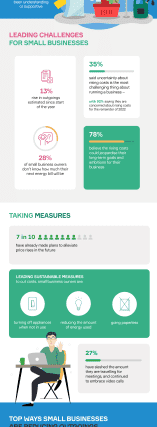These are the top 20 ways small businesses are reducing outgoings


A survey of 500 SMEs revealed 86 per cent are trying to minimise their overheads in an attempt to reduce further increases or keep their prices the same, amid escalating costs.
This includes carefully monitoring their energy bills (33 per cent), shopping around for cheaper suppliers (33 per cent) and putting a freeze on hiring staff (28 per cent).
Advertisement
Hide AdAdvertisement
Hide AdHowever, 26 per cent of these small business owners are working unpaid hours to alleviate the financial pressure.
It also emerged fuel, raw materials and gas and electricity bills are the main rising ‘hidden costs’ putting pressure on the end price of their product or service for the consumer.
And 28 per cent struggle with not knowing how much their next energy bill will be.


'Inevitable' challenges on the rise
To keep a closer eye on the intensifying costs, 72 per cent either have a smart meter or are considering getting one to better manage their energy spend.
Advertisement
Hide AdAdvertisement
Hide AdUnfortunately, 61 per cent who are yet to increase their prices think it is ‘inevitable’ if the current trajectory continues – and 77 per cent fear they will have to hike their prices within the next six months.
But for those who have already had to increase their costs, 85 per cent said it was the ‘last resort’.
And while 44 per cent said their customers have been understanding, 53 per cent have lost some as a result.
The research was commissioned by Smart Energy GB to mark the launch of Costs, Energy & Going Green, a guide to help small businesses with the current challenges.
Advertisement
Hide AdAdvertisement
Hide AdSpokesperson Fflur Lawton said: “Small businesses are facing many of the same challenges and price hikes that consumers are.
“And it’s inevitable that increased running costs will be passed on to customers in some instances.
“However, new research has found that many businesses are trying their best to minimise the impact of these price rises on their customers and are going to great lengths to keep their overheads as low as possible.”
A welcome relief
The study found small business owners estimate their outgoings have risen by 13 per cent since the start of the year.
Advertisement
Hide AdAdvertisement
Hide AdWhile 35 per cent said uncertainty about rising costs is the most challenging thing about running a business – with 92 per cent concerned about intensifying costs for the remainder of 2022.
And 78 per cent believe the rising costs could jeopardise their long-term goals and ambitions for their business.
Working long hours and significant world events – such as the pandemic – also ranked among the leading challenges small businesses are facing.
Nearly seven in 10 (69 per cent) said plans are already being formulated so they can avoid increased prices in the remainder of this year.
Advertisement
Hide AdAdvertisement
Hide AdTurning off appliances when not in use, reducing the amount of energy used and going paperless are the leading sustainable measures small business owners have taken to cut costs.
While 27 per cent have slashed the amount they are travelling for meetings and continued to embrace video calls.
Fflur Lawton added: “When you are focused on keeping a business running smoothly, anything that helps make the day-to-day challenges a bit easier can be a welcome relief.
“As smart meters securely send data directly to energy suppliers, businesses only ever pay for what they actually use – which can be a great help with cash flow.
Advertisement
Hide AdAdvertisement
Hide Ad“There’s also no need for business owners to do manual meter readings as they’re sent automatically, so getting a smart meter installed can be a great time saver too.”
Top ways small businesses are reducing outgoings
- Keeping a closer track of monthly bills
- Shopping around for different suppliers
- Monitoring energy usage more closely
- Not hiring more staff
- Shopping around for cheaper insurance
- Working unpaid hours
- Not purchasing any new IT software
- Not purchasing any new office equipment
- Not purchasing any new IT hardware
- Reducing marketing budgets
- Fewer company vehicle journeys to reduce fuel costs
- Changing to cheaper raw materials for products
- Encouraging more working from home
- Negotiating reduced rents
- Switching to greener solutions
- Retraining existing staff to avoid hiring someone new
- Introducing stricter rules for staff expenses
- Moving to smaller/cheaper premises
- Outsourcing certain jobs to avoid hiring someone new
- Getting rid of office space